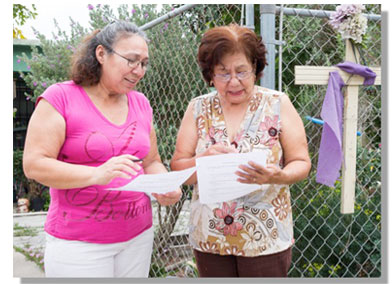[SPEAKER]
The effectiveness of CHWs depends on their ability to establish trusting peer-to-peer relationships as a basis for pursuing mutual goals. The CHW must secure and maintain trust and credibility in the community to be effective.
Perhaps this ability can be taught, but numerous sources credit the fact that community members see the CHW as “someone like us.” Patients often do not have the chance to develop close relationship with busy health professionals, but relationships between CHWs and patients can help create the candor and openness necessary for efficient, accurate diagnoses and effective treatment.
At the same time, in many communities, particularly among people of color, mistrust of major institutions, medical providers, and research—especially medical research—is deep and historic. CHWs’ peer relationships in the community may help to open the door, but the CHW must act thoughtfully and deliberately to avoid being lumped together with institutions and researchers as an object of mistrust.
Many employers, including direct supervisors, fail to understand this dynamic.
One way CHWs create and maintain trust in the community is by devoting attention to developing the community itself. Many CHWs do not see themselves as service providers at all; they see themselves as “lifting up” their community, which means leaving individuals, families, and the entire community stronger than they were. This outcome requires, in part, that the CHW devote attention to the family’s stage of development and be prepared to phase out of the relationship when a certain degree of self-sufficiency is reached.
A significant thread running through the philosophy of CHW training and education is the notion of dealing with individuals, families, and communities according to their strengths and resources rather than according to their deficiencies. This approach begins with “strengths-based assessment” and tailoring approaches to the family’s goals by cultivating and supplementing the family’s own resources and strengths. It also involves cultivating and strengthening the social networks and resources available to the family. In fact, some researchers are pursuing the hypothesis that CHWs produce change not by direct individual interventions but by building “social capital,” or the degree of connectedness within a community.
 The companion piece to the CHW’s expertise in understanding the community is the ability to establish trusting peer-to-peer relationships as a basis for pursuing mutual goals.
The companion piece to the CHW’s expertise in understanding the community is the ability to establish trusting peer-to-peer relationships as a basis for pursuing mutual goals.
